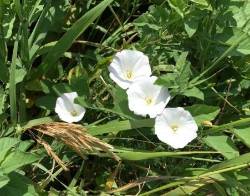Field Bindweed

This member of the Morning Glory family is also called Creeping Jenny and is a native of Eurasia who was first introduced to the US via contaminated field and garden seed in the mid-1700s. It is found in every state in the US and is listed as a noxious weed in 22 states in total. Field bindweed is an almost delicate-looking vine with arrow or shield-shaped leaves and white flowers.
Field bindweed is a perennial weed with an extensive and deep fibrous root system that can reproduce both by the roots and via seed. Each field bindweed plant can produce up to 600 seeds, of which 90% are viable, 25% will germinate in the first year, and the seeds are viable in the ground for 60 years or more. One of the reasons field bindweed is challenging to control is its ability to reproduce by pieces of the roots. The root system can go up to 20 feet in the ground, and the plant can regrow from a root bud up to 14 feet below the ground.
There are a couple of options when trying to manage this weed. The first is mechanical control, which involves hand-pulling seedlings and young plants and hoeing or tilling every couple of weeks during the growing season. Using mulch or weed mats in flower beds or gardens can help slow the spread by reducing the amount of sunlight that reaches the ground. Biological controls are available; however, they are unfortunately ineffective and hard to establish. Chemical treatment is often the best bet, but it will have to be continued for several years until the seed and root reserves have been exhausted. In flower beds and gardens, products with the active ingredient glyphosphate are most commonly used, while lawn products containing 2,4-D, triclopyr, dicamba, or combinations of those products are recommended. Field bindweed is a tough customer, but with time and persistence, it can be eradicated.

Have questions? Contact our office where our Horticulture Extension Agent will assist you with questions.
Phone: (316) 321-9660
Email: callae@ksu.edu